Right now we’re in a golden age of dark academia. But what exactly is this evocative—and apparently provocative—subgenre?
Dark academia books are usually set in an idealized world of higher education, and the key is in the atmosphere. It’s old libraries swirled with dust motes, cable-knit sweaters and tweed blazers, crunchy autumn leaves and steaming pots of tea, pretentious professors, and all the glorious messiness of being out in the world on your own for the first time.
For me, though, a true dark academia book is not just about the aesthetic. The best dark academia books contain an inextricable link between the plot and academia itself; for example, a murderer or a monster or another mythological figure whose motivations can only be understood through ancient texts and late-night study sessions. What the students learn during their classes should be integral to overcoming whatever obstacles they face.
I’ve also seen another pattern emerge in the best dark academia releases of recent years: angry heroines. Young women exploring their rage for the first time now that they’re out of their childhood homes, away from all the expectations previously set for them. Unleashing all their pent-up fury, for better or worse.
Alice Wolfe in The Society for Soulless Girls is so angry that within a few chapters, she stabs a lecherous freshman in the stomach with a broken glass bottle—and is so overcome with guilt and shame that she spends the rest of the book trying to carve her anger out at the root. (It’s a sapphic retelling of The Strange Case of Dr. Jekyll and Mr. Hyde, so I don’t think it’s a spoiler to say she splits her soul into good and evil to rather disastrous effect.)
Why are narratives like these so compelling? This is my theory. Girls and women have been shamed for our anger for thousands of years—we’ve been burned at the stake as witches, demonically exorcised in front of jeering mobs, electrified and lobotomized in asylums. Even now, in the twenty-first century, our academic institutions—supposedly pillars of progress—are rife with systemic misogyny, and women who speak up against it are shamelessly passed over for future opportunities. There’s nothing the patriarchy fears more than an angry woman, because an angry woman has agency. An angry woman can push society toward change. Anger is often the most powerful political tool we have.
One of my favorite quotes from The Society for Soulless Girls—spoken to the heroine by, you guessed it, a pretentious professor—is this: “Anger left to run free is like wildfire, indiscriminate in its destruction. But if you learn to tame it, to position it, to take aim with it? Then it becomes a candle. And what is the candle but one of humanity’s greatest assets? It warms, It nourishes. It shines a light in the darkest of places, and illuminates the path forward.”
Dark academia shelves are an embarrassment of riches at the moment, so if you’re looking for a place to start, may I humbly recommend these other books starring angry—and determined—young women?
A Study in Drowning by Ava Reid
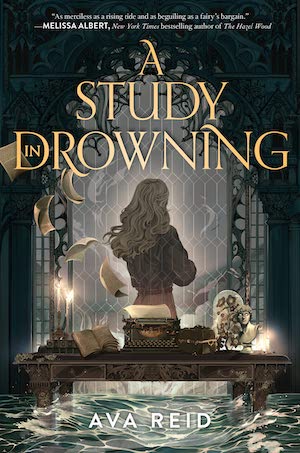
Nobody writes traumatized girls better than Reid, and Effy Sayre is no exception. Not only has she suffered from anxiety for most of her life—relying on a little bottle of sleeping pills she takes with her everywhere—but she’s also grappling with a troubled mother-daughter relationship, as well as PTSD after a nonconsensual affair with a professor at her architecture college. After her innocence was so gracelessly torn away from her, Effy is left by turns introspective and deeply angry.
A longtime believer in fairy tales, our thorny heroine Effy finds comfort in the pages of Angharad, author Emrys Myrddin’s beloved epic about a mortal girl who falls in love with the Fairy King and then destroys him. So when Myrddin’s family announces a contest to design the late author’s house, Effy will stop at nothing to win.
But the rotting Hiraeth Manor is not what she expected, and Effy isn’t the only one who’s made a temporary home there. Preston Héloury, a pretentious literature scholar, is determined to prove her favorite author is a fraud. As the two rival students investigate the reclusive author’s legacy, piecing together clues through his written ephemera, they discover dark forces, both mortal and magical, conspiring against them. The only way to rise up against these forces is to let her rival in beyond her barbed edges, but can she bury her trauma deep enough to allow that to happen?
A Lesson in Vengeance by Victoria Lee
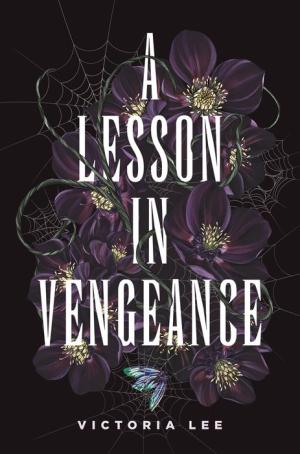
Witchcraft is one of my favorite vehicles for exploring female rage, so this one hit. It’s set at the Dalloway School, an ancient ivy-covered campus in the Catskills drenched in occult history. Felicity Morrow is returning after a yearlong absence following the shocking death of her girlfriend, only to discover that her dorm is haunted by the spirits of the Dalloway Five, who all died mysteriously on campus.
Before her girlfriend died, Felicity was drawn to the dark, but now all she wants to do is graduate. Yet when new girl Ellis Haley, a prodigal novelist at seventeen, announces her intention to write a book about the Dalloway Five, Felicity cannot resist getting involved. Ellis is a so-called method writer, and given Felicity’s history with the arcane, they’re the perfect duo to crack this case once and for all. However, history soon begins to repeat itself, and they have to face the darkness in Dalloway—and in themselves.
As the title suggests, this is a powerful exploration of the drive for revenge, for justice, for retribution, that so often fuels angry young women to drastic measures. And as someone who can seriously hold a grudge (see aforementioned literary nemesis), it’s a narrative I find endlessly compelling.
Curious Tides by Pascale Lacelle
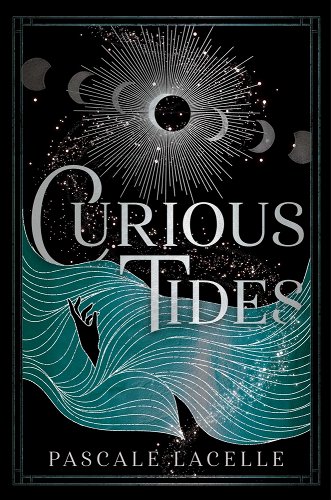
One of my top reads of the year, this is a dark academia set in a rich fantasy world with detailed, immersive lunar magic. It opens with a mass drowning and our heroine, Emory, is the lone survivor. Much of the book deals with the emotional aftermath of such a tragic event—while weaving the why into an addictive Bardugo-esque plot with a lovable cast of misfits at the helm.
After the tragedy, Emory is plagued by strange, impossible powers that no healer should possess, as well as a rising tide of grief and anger over what happened to her. Determined to find the truth behind the drownings and the cult-like secret society she’s convinced her classmates were involved in, Emory is faced with even more questions when the supposedly drowned students start washing ashore—alive—only for them each immediately to die horrible, magical deaths.
When her new magic captures the society’s attention, she finds herself drawn into their world of privilege and power, all while wondering if the truth she’s searching for might lead her right back to Dovermere . . . to face the fate she was never meant to escape.
Emory’s anger constantly simmers below the surface, pulling the plot forward like a tidal undertow. Why does she feel so ostracized by the academic institution that’s supposed to feel like home? Why are these awful powers manifesting in her? And why, for the love of the Drowned Gods, is she the only one who survived such a horrible tragedy?
I Feed Her to the Beast and the Beast Is Me by Jamison Shea
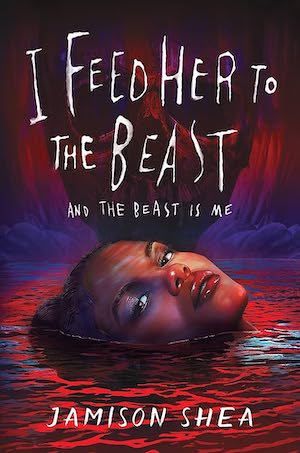
Righteous rage abounds in this absurdly accomplished debut—a slow-burn horror with a twisted, vengeful heart. I devoured this in a single sitting, completely swept up in the moody aesthetic (think bright opera halls, soft ballet silk, and Paris smudged by rain) and the furious heroine’s spiralling descent into villainy.
Laure Mesny will stop at nothing to destroy the racist and misogynistic institutions in the cutthroat world of Parisian ballet. Prejudice and favoritism run through her elite academy’s veins, and if the only way to extricate it is to bleed the school’s body dry …so be it.
Hellbent on defeating her privileged peers, she journeys deep into the pulsing belly of the city’s catacombs and makes a deal with a very chill and not at all terrifying river of blood. The primordial power grants Laure universal adoration and she begins her violent rise to stardom—leaving a trail of broken bodies in her wake.
But soon more monsters emerge from the shadows, threatening to drag her down into the underworld where she belongs, and she must decide whether external validation is really worth the pain and bloodshed.
The Grimrose Girls by Laura Pohl
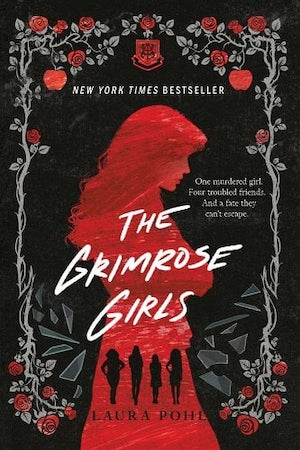
There’s a common theme in these book recommendations: fiercely determined young women searching for the truth when the world seems hellbent on hiding it from them. Of course, a patriarchal society is prone to painting determination as anger when it comes from a woman, and that’s partially what drew me to this story—where do the lines blur? What happens when they do? (Something Jamison, above, also explores to devastating effect.)
The Grimrose Girls is about four friends, one murder, and a dark fate that may leave them all doomed.
After the mysterious death of their best friend, Ella, Yuki, and Rory are the talk of their elite school, Grimrose Académie. The police ruled Ariane’s death as a suicide, but the trio is determined to find out what really happened. As they retrace their friend’s final days, they discover a dark secret about Grimrose—Ariane wasn’t the first dead girl, and she certainly won’t be the last.
They soon learn that all the past murders are connected to ancient fairy-tale curses, and that their own fates are tied to the stories, dooming the girls to brutal and gruesome endings unless they can break the cycle for good.
Plain Bad Heroines by Emily M. Danforth
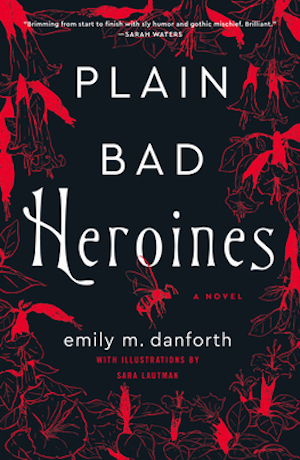
If the title doesn’t already have you sold, allow me to further convince you. Like all the other writers on this list, Danforth employs one of my favorite dark academia devices—fictional authors and books within the world, which are central to solving the central mystery.
It’s less about anger as an internal force, but rather about the external labels slapped onto sapphic women—and what happens when a cultish group of girls rails against those labels.
Flo and Clara, two students at Brookhants School for Girls, are obsessed with a daring young writer named Mary MacLane, the author of a scandalous bestselling memoir. To show their devotion to Mary, the girls establish their own private club and call it The Plain Bad Heroine Society. Until their corpses are later discovered with a copy of Mary’s book splayed beside them, the victims of a swarm of stinging, angry yellow jackets.
(Wasps are a central motif—and, at least the way I read it, an allegory for female anger. The way we feel emboldened when part of a hive, the way we sting anyone who gets too close.)
Over a century later, the now-abandoned and crumbling Brookhants is back in the news when wunderkind writer Merritt Emmons publishes a breakout book celebrating the queer, feminist history surrounding the institution. Her bestselling book even inspires a controversial horror film adaptation. But as Brookhants opens its gates once again, and our three modern heroines arrive on set to begin filming, past and present become grimly entangled—or perhaps just grimly exploited—and soon it’s impossible to tell where the curse leaves off and Hollywood begins.
Buy the Book
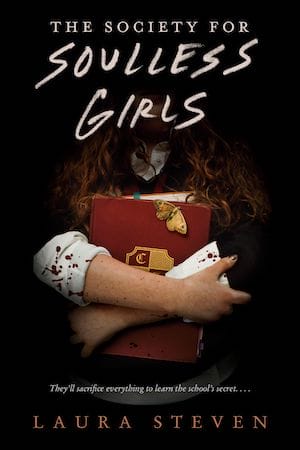

The Society for Soulless Girls
Laura Steven is an award-winning author from the northernmost town in England. She has published several books for young adults. Her recent dark academia titles include sapphic TikTok hit The Society for Soulless Girls, a feminist horror retelling of The Strange Case of Dr. Jekyll and Mr. Hyde, and Every Exquisite Thing, which explores beauty standards and body image. Her debut novel, The Exact Opposite of Okay, won the inaugural Comedy Women In Print Prize in 2019, while The Love Hypothesis was optioned for TV by an Emmy-winning team. Her books have been widely translated, and her work has appeared in the i Paper and the Guardian and on BuzzFeed. You can find her on Instagram at @laurasteven and TikTok at @authorlaurasteven.










